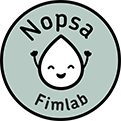Monipuoliset laboratoriopalvelut jokaisen arkeen.
Asiakasneuvonta
(Arkisin klo 8-16)
Ei tutkimustulostiedustelua tai ajanvarausta.
Ajanvaraukseen »
Pohjanmaan alueen asiakasneuvonta
(Arkisin 7-15)
Hedelmöityshoitolaboratorio
(Sperma-analyysin ajanvaraus ja asiakasneuvonta)
Ammattilaisille
(Arkisin klo 7-16)
Kaikki yhteystiedot
Henkilöasiakkaalle
Ammattilaiselle

Tule tutkimuksiin kätevästi omalla lähetteelläsi
Tilaa oman terveyden seurantaan liittyvät tutkimukset ja lähetteet OmaLabra™ -palvelusta.
Tilaa tutkimukset
Nopsa - verikokeisiin helposti ilman ajanvarausta tai vuoronumeroa
Tampereella, Nokialla, Akaassa, Jyväskylässä, Hämeenlinnassa, Lahdessa ja Vaasassa.
Lue lisääTampere: Muutoksia Hervannan laboratorion vuoronumeroasiointiin 29.4.2024
Vuoronumerolla toimiva päivystysnäytteenotto päättyy Fimlabin Hervannan laboratoriossa. Maanantaista 29.4.2024 alkaen voimaan astuvalla muutoksella pyrimme selkiyttämään asiointia ja parantamaan asiakaspalvelun toimivuutta Hervannan toimipisteessämme. Maanantaista 29.4.2024 alkaen päivystysnäytteenotossa voi Tampereella asioida muun muassa Kuninkaankulman ja Hatanpään laboratorioissa sekä TAYSin poliklinikkalaboratoriossa. Hervannan laboratoriossa... lue lisää →
Fimlabin vuosikertomus 2023 on julkaistu / Fimlabs årsberättelse 2023 har publicerats
Fimlabin vuosikertomus vuodelta 2023 on julkaistu 9.4.2024. Vuosikertomus sisältää toimitusjohtajan katsauksen, nostoja Fimlabin monipuolisesta toiminnasta sekä hallituksen toimintakertomuksen ja tilinpäätöksen. Avaa vuosikertomus tästä linkistä (avautuu .pdf-tiedostona): Vuosikertomus 2023 *** Fimlabs årsberättelse för 2023 har publicerats den 9.4.2024. Årsberättelsen innehåller verkställande... lue lisää →
Päijät-Häme: Huumetestauksen valvottuun näytteenottoon voi varata ajan Aleksanterinkadun laboratorioon
Lahden Aleksanterinkadun laboratorioon on avattu mahdollisuus varata aika huumetestauksen valvottuun näytteenottoon. Huhtikuun alusta alkaen Fimlabin ajanvarauspalvelussa on avoinna palvelu Valvottu huumenäytteenotto. Ajanvarausmahdollisuus koskee vain huumetestauksen valvottua näytteenottoa (U-Huum-O 4221). Ajanvarausmahdollisuus ei koske työelämän huumausainetestausta tai opintojen aikaista huumausainetestausta, näiden toiminta... lue lisää →
Yleinen asiakastyytyväisyys
86/100
Mittaamme asiakaskokemusta näytteenottokäyntien jälkeen suositteluindeksi- eli NPS-mittauksella. NPS-luku voi vaihdella -100:n ja +100:n välillä. Mitä suurempi lukema on, sitä suurempi osuus asiakkaistamme suosittelee palvelujamme. Arvo perustuu noin 3300 arvioon maaliskuulta 2024.
